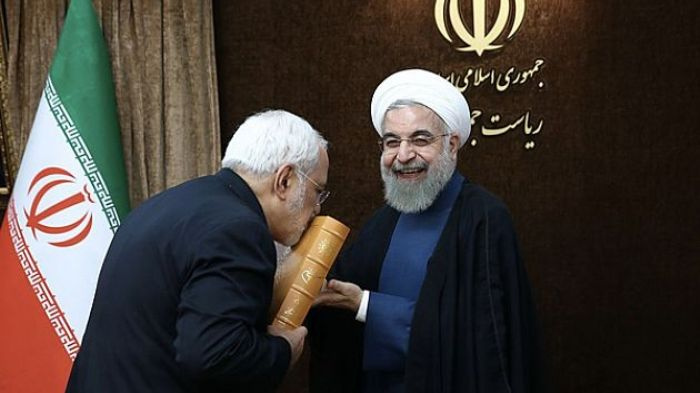Why Lifting Sanctions Is Important for Rouhani’s government

Iran's Supreme Leader Ayatollah Khamenei finally gave his seal of approval to the Joint Comprehensive Plan of Action (JCPOA), but not before describing it as having "numerous ambiguities and structural weaknesses that could inflict big damage on the present and the future of the country in the absence of meticulous and constant monitoring." However, he tied his support for the nuclear agreement to observation of specific measures, including "measures to renovate the Arak plant by preserving its heavy [water] nature will start only after a firm and secure agreement has been signed on an alternative plan, along with sufficient guarantees for its implementation."
The agreement between Iran and world powers entails the termination or suspension of all nuclear-related sanctions, plus the return of Iran's frozen assets in the West. Although the European Union and the US president officially announced the adoption of the JCPOA on October 18, 2015, Western diplomats familiar with the process of nuclear negotiations and the deal have reminded that economic sanctions, especially oil-related sanctions, will be lifted only within the first three months of 2016. According to these informants, the monitoring necessary for lifting the sanctions "will probably be in place by January or February." British Foreign Minister Philip Hammond also told Reuters on Aug 24, 2015 that "international sanctions on Iran could start to be lifted as early as spring next year [in 2016]". German Foreign Minister Frank-Walter Steinmeier has also said that lifting the sanctions "will definitely be no earlier than the end of January." Hassan Rouhani, however, has spoken of a time span of one or two months after the Adoption Day for the sanctions to be lifted. Regarding the Western officials' remarks, Rouhani's timetable seems to be optimistic. According to Michael Crowley in Politico:
Many nuclear experts—including Energy Department technical experts involved in the Iran talks—believe it could take Iran six months or more to complete the work required by the agreement. That work includes uninstalling and storing thousands of centrifuges, whose operation was capped under the deal; refashioning the core of a reactor at Arak to prevent it from producing plutonium; and reducing Iran's stockpile of nuclear material by diluting it or shipping it out of the country.
Crowley also quotes a senior administration official who speaks of a duration of several months before Iran "can actually get the sanctions relief that we’re offering in the deal."
Economic observers such as DJavad Salehi Esfahani believe that the most immediate impact of sanctions on Iran's economy would be the release of overseas frozen assets, estimated at around 29 billion USD by head of Iran's Central Bank Valliollah Seif. Oil, the lifeline of Iranian economy, will also witness a rise in exports. Most important of all will however be the lifting of SWIFT sanctions which will have tangible efforts for Iran's business sector.
What makes this more important is that Iran will be holding two key elections in February 2016, the parliamentary election and the Council of Experts' election. The latter is officially in charge of supervising the conduct of the Supreme Leadership and bodies working under his direction. If termination or suspension of effective sanctions proves unattainable before the elections, Hassan Rouhani and the Reformists will have fewer cards at their disposal to convince the voters to choose their favorite candidates. According to one well-known Reformist, Mohammad-Javad Haghshenas, the February election can bring change to the current state of balance of power between the Reformists and Conservatives. As Haghshenas has stated: "there is no doubt that the JCPOA and lifting of sanctions will influence people's decision. If they can sense the effect of their 2013 presidential election vote, they will take a more active political role".
Inside Iran, the link between the JCPOA and the February 2016 election is already established. Supporters of the government and the Reformists are willing to win the majority in the parliamentary election to advance their main international and domestic goals which are constructive dialogue with the world, particularly the West, and promotion of political rationality inside the country respectively.
Iranian citizens are waiting to see how the JCPOA is going to positively affect their lives, but neither rhetoric nor negotiated documents are enough. What counts for Iranians is the money inside their pocket and how it becomes more or less after the nuclear deal. Unless there is a flow of money towards Iran, SWIFT sanction is lifted; and oil exports have increased, their wallet is not going to bulge.
However, in case all those developments take place, pro-government candidates can expect the flow of votes. A pro-government, pro-Reform vote can also help to form a Council of Experts with Hashemi Rafsanjani as its head, and Ayatollah Khomeini's grandson Hassan Khomeini as one of its key figures. A pro-government parliament that does not throw the wrench in the works of the government and assists Rouhani in his political and economic projects is also foreseeable in that case, which means the power balance will tilt in favor of the 'moderate' camp and the Reformists, or at least will not be as unequal as it is now. The removal of three basic sanctions (SWIFT, oil and frozen assets) will play a critical role for both the Iranian Reformists and the West. After all, for the Western countries it will be easier to solve security and political concerns in cooperation with Rouhani's government.
* This piece was originally published in Iranian Diplomacy Persian. Ali Omidi teaches international relations at Isfahan University.

